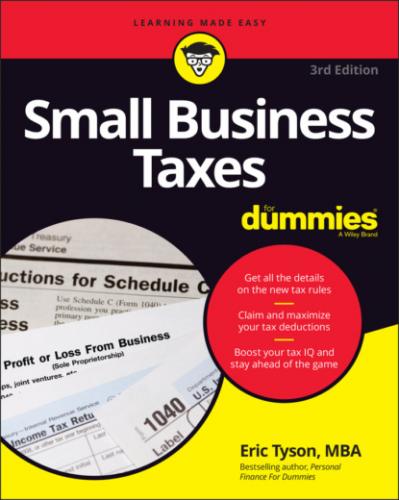Foolish Assumptions
In writing this book, I made some assumptions about you, dear reader:
You want expert advice about important small-business tax and financial topics — such as the best way to purchase and write off equipment and other business expenses, establish and fund retirement accounts, and correctly complete common business tax forms — and you want answers efficiently.
Perhaps you want a crash course in small-business tax and financial issues and are looking for a book to help solidify major financial concepts and get you thinking about your small-business taxes in a more comprehensive way.
This book is basic enough to help novices get their arms around thorny tax issues. But advanced readers will be challenged, as well, to think about their small-business taxes in a new way and identify areas for improvement.
Icons Used in This Book
The icons in this book help you find particular kinds of information that may be of use to you.
Beyond the Book
In addition to the material in the print or e-book you’re reading right now, this product also comes with some access-anywhere goodies on the web. Go to www.dummies.com and type in “Small Business Taxes For Dummies Cheat Sheet” in the search box to discover a list of pointers that can help you think about the role of money in your life and start achieving your financial goals.
Where to Go from Here
This book is organized so you can go wherever you want to find complete information. You can check out the table of contents to find broad categories of information and a chapter-by-chapter rundown of what this book offers, or you can look up a specific topic in the index.
If you’re not sure where you want to go, you may want to turn a few pages and start at the beginning with Part 1. It gives you all the basic information you need to assess your small-business tax situation and points to places where you can find more detailed information for improving it.
Part 1
Understanding Small Business Taxes
IN THIS PART …
Minimize your tax bill through year-round tax planning and understand the tax law changes. Be sure to factor taxes into your small business decisions, check out common tax mistakes, and understand tax terms and rates.
Decide what business entity (corporation, LLC, sole proprietorship, and so on) to use, and consider what benefits to offer to your employees.
Investigate your small-business retirement account options — such as SEP-IRAs, SIMPLE plans, 403(b) plans, and 401(k) plans — and select top-notch investments.
Handle small-business real estate decisions, such as deciding whether to work out of your home, lease space, or buy property.
Plan your estate, including your small business. Determine your estate’s tax concerns and reduce your expected estate taxes.
Chapter 1
Small Business Taxes 101
IN THIS CHAPTER
Even though I write about personal finances, including tax issues, I don’t particularly enjoy dealing with taxes. I would rather cut my lawn, take care of my neighbor’s dog, or even visit my dentist (for a routine cleaning). At least in all these cases, I know my time commitment is reasonably limited, and when I’m done, I’m satisfied that the job has been done well and I can move on to something else.
Filling out state and federal tax forms is often complicated and confusing. Because I write about taxes, I feel that it’s essential for me to complete my own income tax forms and returns, which forces me to wallow in the details as much as possible so that I can more fully appreciate the challenges taxpayers face. (By contrast, prior surveys have found that the representatives in Congress who sit on committees that draft the nation’s tax laws generally use paid tax preparers themselves.) Not surprisingly, a report from the National Taxpayer Advocate cited “the complexity of the tax code as the No. 1 most serious problem facing taxpayers.”
Though some of this book deals with the drudgery of completing required tax forms, much of it deals with the more interesting — and dare I say, fun — part of small business taxes, which is planning ahead and strategizing so as to reduce and minimize your taxes. You see, if you simply view your role with taxes and your small business as jumping through the many hoops that federal, state, and local authorities require, you’re missing out on something potentially really big — saving and keeping more of your hard-earned money.
This chapter introduces the basics of small business taxes. Here, I discuss the value of tax planning all year long. I also explain recent tax law changes along with those you may see in the future. Finally, I define some important tax-related terms regarding the taxes you pay or may come across.
Valuing Year-Round Tax Planning
Taxes are a large, vital piece of your small-business and personal financial puzzle. You’re required by law to complete your
